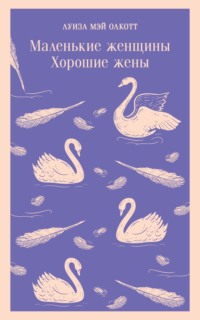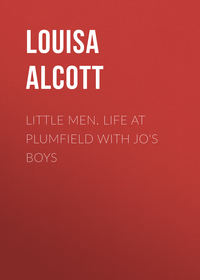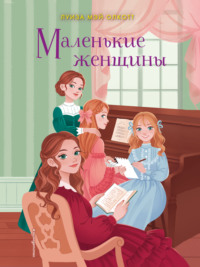 полная версия
полная версияLulu's Library. Volume 3 of 3
The girls dashed into the water, and with shrieks of merriment swam away to capture the gull, who paddled off as if he enjoyed the fun as much as they.
Leaving them to splash vainly to and fro, Tilly swung the creel to her shoulder and went off to leave her lobsters, longing to dance and sing to the music of the silver clinking in her pocket.
When she came back, the bird was far out of reach and the girls diving from her boat, which they had launched without leave. Too happy to care what happened now, Tilly threw herself down on the warm sand to plan a new and still finer cargo for next day.
"I want schooling, and I mean to have it. I 've got no folks of my own; and uncle has married again, so he does n't need me now. If I only had a little money, I could go to school somewhere, and take care of myself. Last summer I worked at the hotel, but I did n't make much, and had to have good clothes, and that took my wages pretty much. Sewing is slow work, and baby-tending leaves me no time to study; so I 've kept on at home picking berries and doing what I could to pick up enough to buy books. Aunt thinks I 'm a fool; but uncle, he says, 'Go ahead, girl, and see what you can do.' And I mean to show him!"
Tilly's brown hand came down on the sand with a resolute thump; and her clear young eyes looked bravely out across the wide sea, as if far away in the blue distance she saw her hope happily fulfilled.
Sophie's eyes shone approval, for she understood this love of independence, and had come to America because she longed for new scenes and greater freedom than her native land could give her. Education is a large word, and both girls felt that desire for self-improvement that comes to all energetic natures. Sophie had laid a good foundation, but still desired more; while Tilly was just climbing up the first steep slope which rises to the heights few attain, yet all may strive for.
"That is beautiful! You will do it! I am glad to help you if I may. See, I have many books; will you take some of them? Come to my room to-morrow and take what will best please you. We will say nothing of it, and it will make me a truly great pleasure."
As Sophie spoke, her little white hand touched the strong, sunburned one that turned to meet and grasp hers with grateful warmth, while Tilly's face betrayed the hunger that possessed her, for it looked as a starving girl's would look when offered a generous meal.
"I will come. Thank you so much! I don't know anything, but just blunder along and do the best I can. I got so discouraged I was real desperate, and thought I 'd have one try, and see if I could n't earn enough to get books to study this winter. Folks buy berries at the cottages; so I just added flowers and shells, and I 'm going to bring my boxes of butterflies, birds' eggs, and seaweeds. I 've got lots of such things; and people seem to like spending money down here. I often wish I had a little of what they throw away."
Tilly paused with a sigh, then laughed as an impatient movement caused a silver clink; and slapping her pocket, she added gayly, -
"I won't blame 'em if they 'll only throw their money in here."
Sophie's hand went involuntarily toward her own pocket, where lay a plump purse, for papa was generous, and simple Sophie had few wants. But something in the intelligent face opposite made her hesitate to offer as a gift what she felt sure Tilly would refuse, preferring to earn her education if she could.
"Come often, then, and let me exchange these stupid bills for the lovely things you bring. We will come this afternoon to see you if we may, and I shall like the butterflies. I try to catch them; but people tell me I am too old to run, so I have not many."
Proposed in this way, Tilly fell into the little trap, and presently rowed away with all her might to set her possessions in order, and put her precious earnings in a safe place. The mermaids clung about the boat as long as they dared, making a pretty tableau for the artists on the rocks, then swam to shore, more than ever eager for the picnic on Light-house Island.
They went, and had a merry time; while Tilly did the honors and showed them a room full of treasures gathered from earth, air, and water, for she led a lonely life, and found friends among the fishes, made playmates of the birds, and studied rocks and flowers, clouds and waves, when books were wanting.
The girls bought gulls' wings for their hats, queer and lovely shells, eggs and insects, seaweeds and carved wood, and for their small brothers, birch baskets and toy ships, made by Uncle Hiram, who had been a sailor.
When Tilly had sold nearly everything she possessed (for Fanny and Sophie bought whatever the others declined), she made a fire of drift-wood on the rocks, cooked fish for supper, and kept them till moonrise, telling sea stories or singing old songs, as if she could not do enough for these good fairies who had come to her when life looked hardest and the future very dark. Then she rowed them home, and promising to bring loads of fruit and flowers every day, went back along a shining road, to find a great bundle of books in her dismantled room, and to fall asleep with wet eyelashes and a happy heart.
,, class:: center medium
IIFor a month Tilly went daily to the Point with a cargo of pretty merchandise, for her patrons increased; and soon the ladies engaged her berries, the boys ordered boats enough to supply a navy, the children clamored for shells, and the girls depended on her for bouquets and garlands for the dances that ended every summer day. Uncle Hiram's fish was in demand when such a comely saleswoman offered it; so he let Tilly have her way, glad to see the old tobacco-pouch in which she kept her cash fill fast with well-earned money.
She really began to feel that her dream was coming true, and she would be able to go to the town and study in some great school, eking out her little fund with light work. The other girls soon lost their interest in her, but Sophie never did; and many a book went to the island in the empty baskets, many a helpful word was said over the lilies or wild honeysuckle Sophie loved to wear, and many a lesson was given in the bare room in the light-house tower which no one knew about but the gulls and the sea-winds sweeping by the little window where the two heads leaned together over one page.
"You will do it, Tilly, I am very sure. Such a will and such a memory will make a way for you; and one day I shall see you teaching as you wish. Keep the brave heart, and all will be well with you," said Sophie, when the grand breaking-up came in September, and the girls were parting down behind the deserted bathhouses.
"Oh, Miss Sophie, what should I have done without you? Don't think I have n't seen and known all the kind things you have said and done for me. I 'll never forget 'em; and I do hope I 'll be able to thank you some day," cried grateful Tilly, with tears in her clear eyes that seldom wept over her own troubles.
"I am thanked if you do well. Adieu; write to me, and remember always that I am your friend."
Then they kissed with girlish warmth, and Tilly rowed away to the lonely island; while Sophie lingered on the shore, her handkerchief fluttering in the wind, till the boat vanished and the waves had washed away their footprints on the sand.
,, class:: center medium
IIIDecember snow was falling fast, and the wintry wind whistled through the streets; but it was warm and cosey in the luxurious parlor where Di and Do were sitting making Christmas presents, and planning what they would wear at the party Fanny was to give on Christmas Eve.
"If I can get mamma to buy me a new dress, I shall have something yellow. It is always becoming to brunettes, and I 'm so tired of red," said Di, giving a last touch to the lace that trimmed a blue satin sachet for Fanny.
"That will be lovely. I shall have pink, with roses of the same color. Under muslin it is perfectly sweet." And Dora eyed the sunflower she was embroidering as if she already saw the new toilet before her.
"Fan always wears blue, so we shall make a nice contrast. She is coming over to show me about finishing off my banner-screen; and I asked Sophie to come with her. I want to know what she is going to wear," said Di, taking a little sniff at the violet-scented bag.
"That old white cashmere. Just think! I asked her why she did n't get a new one, and she laughed and said she could n't afford it. Fan told me Sophie's father sent her a hundred dollars not long ago, yet she has n't got a thing that we know of. I do think she 's mean."
"She bought a great bundle of books. I was there when the parcel came, and I peeped while she was out of the room, because she put it away in a great hurry. I 'm afraid she is mean, for she never buys a bit of candy, and she wears shabby boots and gloves, and she has made over her old hat instead of having that lovely one with the pheasant's breast in it."
"She's very queer; but I can't help liking her, she's so pretty and bright and obliging. I 'd give anything if I could speak three languages and play as she does."
"So would I. It seems so elegant to be able to talk to foreigners. Papa had some Frenchmen to dinner the other day, and they were so pleased to find they need n't speak English to Sophie. I could n't get on at all; and I was so mortified when papa said all the money he had spent on my languages was thrown away."
"I would n't mind. It's so much easier to learn those things abroad, she would be a goose if she did n't speak French better than we do. There's Fan! she looks as if something had happened. I hope no one is ill and the party spoiled."
As Dora spoke, both girls looked out to see Fanny shaking the snow from her seal-skin sack on the doorstep; then Do hastened to meet her, while Di hid the sachet, and was hard at work on an old-gold sofa cushion when the new-comer entered.
"What's the matter? Where's Sophie?" exclaimed the girls together, as Fan threw off her wraps and sat down with a tragic sigh.
"She will be along in a few minutes. I 'm disappointed in her! I would n't have believed it if I had n't seen them. Promise not to breathe a word to a living soul, and I 'll tell you something dreadful," began Fanny, in a tone that caused her friends to drop their work and draw their chairs nearer, as they solemnly vowed eternal silence.
"I 've seen Sophie's Christmas presents, – all but mine; and they are just nothing at all! She has n't bought a thing, not even ribbons, lace, or silk, to make up prettily as we do. Only a painted shell for one, an acorn emery for another, her ivory fan with a new tassel for a third, and I suspect one of those nice handkerchiefs embroidered by the nuns for me, or her silver filigree necklace. I saw the box in the drawer with the other things. She's knit woollen cuffs and tippets for the children, and got some eight-cent calico gowns for the servants. I don't know how people do things in Switzerland, but I do know that if I had a hundred dollars in my pocket, I would be more generous than that!"
As Fanny paused, out of breath, Di and Do groaned in sympathy, for this was indeed a sad state of things; because the girls had a code that Christmas being the season for gifts, extravagance would be forgiven then as at no other time.
"I have a lovely smelling-bottle for her; but I 've a great mind not to give it now," cried Di, feeling defrauded of the bracelet she had plainly hinted she would like.
"I shall heap coals of fire on her head by giving her that;" and Dora displayed a very useless but very pretty apron of muslin, lace, and carnation ribbon.
"It is n't the worth of the things. I don't care for that so much as I do for being disappointed in her; and I have been lately in more ways than one," said Fanny, listlessly taking up the screen she was to finish. "She used to tell me everything, and now she does n't. I 'm sure she has some sort of a secret; and I do think I ought to know it. I found her smiling over a letter one day; and she whisked it into her pocket and never said a word about it. I always stood by her, and I do feel hurt."
"I should think you might! It's real naughty of her, and I shall tell her so! Perhaps she 'll confide in you then, and you can just give me a hint; I always liked Sophie, and never thought of not giving my present," said Dora, persuasively, for both girls were now dying with curiosity to know the secret.
"I 'll have it out of her, without any dodging or bribing. I 'm not afraid of any one, and I shall ask her straight out, no matter how much she scowls at me," said dauntless Di, with a threatening nod.
"There she is! Let us see you do it now!" cried Fanny, as the bell rang, and a clear voice was heard a moment later asking if Mademoiselle was in.
"You shall!" and Di looked ready for any audacity.
"I 'll wager a box of candy that you don't find out a thing," whispered Do.
"Done!" answered Di, and then turned to meet Sophie, who came in looking as fresh as an Alpine rose with the wintry wind.
"You dear thing! we were just talking of you. Sit here and get warm, and let us show you our gifts. We are almost done, but it seems as if it got to be a harder job each Christmas. Don't you find it so?"
"But no; I think it the most charming work of all the year," answered Sophie, greeting her friend, and putting her well-worn boots toward the fire to dry.
"Perhaps you don't make as much of Christmas as we do, or give such expensive presents. That would make a great difference, you know," said Di, as she lifted a cloth from the table where her own generous store of gifts was set forth.
"I had a piano last year, a set of jewels, and many pretty trifles from all at home. Here is one;" and pulling the fine gold chain hidden under her frills, Sophie showed a locket set thick with pearls, containing a picture of her mother.
"It must be so nice to be rich, and able to make such fine presents. I 've got something for you; but I shall be ashamed of it after I see your gift to me, I 'm afraid."
Fan and Dora were working as if their bread depended on it, while Di, with a naughty twinkle in her eye, affected to be rearranging her pretty table as she talked.
"Do not fear that; my gifts this year are very simple ones. I did not know your custom, and now it is too late. My comfort is that you need nothing, and having so much, you will not care for my-what you call-coming short."
Was it the fire that made Sophie's face look so hot, and a cold that gave a husky sort of tone to her usually clear voice? A curious expression came into her face as her eyes roved from the table to the gay trifles in her friend's hands; and she opened her lips as if to add something impulsively. But nothing came, and for a moment she looked straight out at the storm as if she had forgotten where she was.
"'Shortcoming' is the proper way to speak it But never mind that, and tell me why you say 'too late'?" asked Di, bent on winning her wager.
"Christmas comes in three days, and I have no time," began Sophie.
"But with money one can buy plenty of lovely things in one day," said Di.
"No, it is better to put a little love and hard work into what we give to friends, I have done that with my trifles, and another year I shall be more ready."
There was an uncomfortable pause, for Sophie did not speak with her usual frankness, but looked both proud and ashamed, and seemed anxious to change the subject, as she began to admire Dora's work, which had made very little progress during the last fifteen minutes.
Fanny glanced at Di with a smile that made the other toss her head and return to the charge with renewed vigor.
"Sophie, will you do me a favor?"
"With much pleasure."
"Do has promised me a whole box of French bonbons, and if you will answer three questions, you shall have it."
"Allons," said Sophie, smiling.
"Haven't you a secret?" asked Di, gravely.
"Yes."
"Will you tell us?"
"No."
Di paused before she asked her last question, and Fan and Dora waited breathlessly, while Sophie knit her brows and looked uneasy.
"Why not?"
"Because I do not wish to tell it."
"Will you tell if we guess?"
"Try."
"You are engaged."
At this absurd suggestion Sophie laughed gayly, and shook her curly head.
"Do you think we are betrothed at sixteen in my country?"
"I know that is an engagement ring, – you made such a time about it when you lost it in the water, and cried for joy when Tilly dived and found it."
"Ah, yes, I was truly glad. Dear Tilly, never do I forget that kindness!" and Sophie kissed the little pearl ring in her impulsive way, while her eyes sparkled and the frown vanished.
"I know a sweetheart gave it," insisted Di, sure now she had found a clew to the secret.
"He did," and Sophie hung her head in a sentimental way that made the three girls crowd nearer with faces full of interest.
"Do tell us all about it, dear. It's so interesting to hear love-stories. What is his name?" cried Dora.
"Hermann," simpered Sophie, drooping still more, while her lips trembled with suppressed emotion of some sort.
"How lovely!" sighed Fanny, who was very romantic.
"Tell on, do! Is he handsome?"
"To me the finest man in all the world," confessed Sophie, as she hid her face.
"And you love him?"
"I adore him!" and Sophie clasped her hands so dramatically that the girls were a little startled, yet charmed at this discovery.
"Have you his picture?" asked Di, feeling that she had won her wager now.
"Yes," and pulling out the locket again, Sophie showed in the other side the face of a fine old gentleman who looked very like herself.
"It's your father!" exclaimed Fanny, rolling her blue eyes excitedly. "You are a humbug!" cried Dora. "Then you fibbed about the ring," said Di, crossly.
"Never! It is mamma's betrothal ring; but her finger grew too plump, and when I left home she gave the ring to me as a charm to keep me safe. Ah, ha! I have my little joke as well as you, and the laugh is for me this time." And falling back among the sofa cushions, Sophie enjoyed it as only a gay girl could. Do and Fanny joined her; but Di was much disgusted, and vowed she would discover the secret and keep all the bonbons to herself.
"You are most welcome; but I will not tell until I like, and then to Fanny first. She will not have ridicule for what I do, but say it is well, and be glad with me. Come now and work. I will plait these ribbons, or paint a wild rose on this pretty fan. It is too plain now. Will you that I do it, dear Di?"
The kind tone and the prospect of such an ornament to her gift appeased Di somewhat; but the mirthful malice in Sophie's eyes made the other more than ever determined to be even with her by and by.
Christmas Eve came, and found Di still in the dark, which fact nettled her sadly, for Sophie tormented her and amused the other girls by pretended confidences and dark hints at the mystery which might never, never be disclosed.
Fan had determined to have an unusually jolly party; so she invited only her chosen friends, and opened the festivities with a Christmas tree, as the prettiest way of exchanging gifts and providing jokes for the evening in the shape of delusive bottles, animals full of candy, and every sort of musical instrument to be used in an impromptu concert afterward. The presents to one another were done up in secure parcels, so that they might burst upon the public eye in all their freshness. Di was very curious to know what Fan was going to give her, – for Fanny was a generous creature and loved to give. Di was a little jealous of her love for Sophie, and could n't rest till she discovered which was to get the finer gift.
So she went early and slipped into the room where the tree stood, to peep and pick a bit, as well as to hang up a few trifles of her own. She guessed several things by feeling the parcels; but one excited her curiosity intensely, and she could not resist turning it about and pulling up one corner of the lid. It was a flat box, prettily ornamented with sea-weeds like red lace, and tied with scarlet ribbons. A tantalizing glimpse of jeweller's cotton, gold clasps, and something rose-colored conquered Di's last scruples; and she was just about to untie the ribbons when she heard Fanny's voice, and had only time to replace the box, pick up a paper that had fallen out of it, and fly up the back stairs to the dressing-room, where she found Sophie and Dora surveying each other as girls always do before they go down.
"You look like a daisy," cried Di, admiring Dora with great interest, because she felt ashamed of her prying, and the stolen note in her pocket.
"And you like a dandelion," returned Do, falling back a step to get a good view of Di's gold-colored dress and black velvet bows.
"Sophie is a lily of the valley, all in green and white," added Fanny, coming in with her own blue skirts waving in the breeze.
"It does me very well. Little girls do not need grand toilets, and I am fine enough for a 'peasant,'" laughed Sophie, as she settled the fresh ribbons on her simple white cashmere and the holly wreath in her brown hair, but secretly longing for the fine dress she might have had.
"Why didn't you wear your silver necklace? It would be lovely on your pretty neck," said Di, longing to know if she had given the trinket away.
But Sophie was not to be caught, and said with a contented smile, "I do not care for ornaments unless some one I love gives me them. I had red roses for my bouquet de corsage; but the poor Madame Page was so triste, I left them on her table to remember her of me. It seemed so heartless to go and dance while she had only pain; but she wished it."
"Dear little Sophie, how good you are!" and warm-hearted Fan kissed the blooming face that needed no roses to make it sweet and gay.
Half an hour later, twenty girls and boys were dancing round the brilliant tree. Then its boughs were stripped. Every one seemed contented; even Sophie's little gifts gave pleasure, because with each went a merry or affectionate verse, which made great fun on being read aloud. She was quite loaded with pretty things, and had no words to express her gratitude and pleasure.
"Ah, you are all so good to me! and I have nothing beautiful for you. I receive much and give little, but I cannot help it! Wait a little and I will redeem myself," she said to Fanny, with eyes full of tears, and a lap heaped with gay and useful things.
"Never mind that now; but look at this, for here's still another offering of friendship, and a very charming one, to judge by the outside," answered Fan, bringing the white box with the sea-weed ornaments.
Sophie opened it, and cries of admiration followed, for lying on the soft cotton was a lovely set of coral. Rosy pink branches, highly polished and fastened with gold clasps, formed necklace, bracelets, and a spray for the bosom. No note or card appeared, and the girls crowded round to admire and wonder who could have sent so valuable a gift.
"Can't you guess, Sophie?" cried Dora, longing to own the pretty things.
"I should believe I knew, but it is too costly. How came the parcel, Fan? I think you must know all," and Sophie turned the box about, searching vainly for a name.
"An expressman left it, and Jane took off the wet paper and put it on my table with the other things. Here's the wrapper; do you know that writing?" and Fan offered the brown paper which she had kept.
"No; and the label is all mud, so I cannot see the place. Ah, well, I shall discover some day, but I should like to thank this generous friend at once. See now, how fine I am! I do myself the honor to wear them at once."
Smiling with girlish delight at her pretty ornaments, Sophie clasped the bracelets on her round arms, the necklace about her white throat, and set the rosy spray in the lace on her bosom. Then she took a little dance down the room and found herself before Di, who was looking at her with an expression of naughty satisfaction on her face.
"Don't you wish you knew who sent them?"
"Indeed, yes;" and Sophie paused abruptly.
"Well, I know, and I won't tell till I like. It's my turn to have a secret; and I mean to keep it."
"But it is not right," began Sophie, with indignation.









